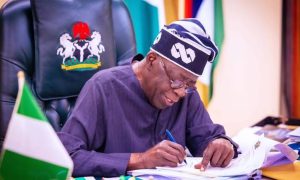
The national President of the Host Communities Producing Oil and Gas (HOSTCOM), Dr. Benjamin Style, expressed his felicitations to Engr. Gbenga Komolafe FNSE, the Chief Executive of the Nigerian Upstream Petroleum Regulatory Commission (NUPRC), on his 60th birthday.
Dr. Style commended Komolafe for his contributions to the Upstream Petroleum sector and the development of Host Communities.
He stated, “Engr. Gbenga has also spoken strongly against the lack of commitment on the part of the oil Companies to the remittance of 3% annual OPEX to host communities as he has called on oil multinationals to do the needful in other not to risk revocation of their licenses.”
In response to this, Dr. Style indicated that Host Communities’ organizations would mobilize to ensure compliance with PIA regulations by oil companies. He mentioned the potential for picketing multinational corporations that fail to meet their 3% PIA remittance obligations.
Dr. Style also expressed his commitment to supporting the Commission in its engagement with host communities and wished Engr. Gbenga Komolafe more wisdom to impact both the Commission and the Host Communities (HOSTCOM).
APC Government Challenged to Reveal Petrol Pricing Template
Phrank Shaibu, the Special Assistant on Public Communication to former Vice President Atiku Abubakar, challenged the APC-led Federal Government to make public the landing cost of petrol and the pricing template being used to maintain the cost at less than N640 per litre.
Shaibu argued that despite claims of petroleum sector deregulation, subsidy was still being paid, which contradicts the mandates of the Petroleum Industry Act. He called on the government to explain how petrol is sold below N650 per litre when international crude oil prices are higher and the exchange rate is unfavorable.
Shaibu criticized the APC-led government for various issues, including the detention of former officials and questioned the party’s claims of good governance.
He called on the government to focus on governance rather than propaganda and expressed concern about the state of Nigeria’s economy and poverty levels.
NUPRC Threatens to Revoke Licenses of Defaulting Oil Companies
The Nigerian Upstream Petroleum Regulatory Commission (NUPRC) issued an ultimatum to oil companies that have defaulted in remitting the 3% operating cost to oil-bearing communities as mandated by the Petroleum Industry Act (PIA). NUPRC warned that failure to comply by the end of September 2023 might result in the revocation of licenses. The Commission emphasized the importance of compliance with PIA regulations and the potential consequences of continued default, including disruptions to oil and gas operations and national economic stability.
NUPRC called on operators to fulfill their obligations by remitting the 3% statutory fees to oil communities without further delay. The Commission expressed concern that the failure to remit these fees had caused tensions in host communities and could harm foreign exchange and foreign direct investment into the country.”
Delta Communities Petition EFCC Over Alleged Diversion of Oil Derivation Fund
Representatives of oil and gas communities in Delta State submitted a petition to the Economic and Financial Crimes Commission (EFCC), urging them to investigate former Delta Governor Ifeanyi Okowa for the alleged diversion of N1.07 trillion from the 13 percent oil derivation fund.
The association claimed that Okowa’s administration did not fully remit the legally prescribed 50 percent allocation to the Delta State Oil Producing Areas Development Commission (DESOPADEC). They requested EFCC’s assistance in recovering the allegedly diverted funds.
The petition highlighted the importance of proper allocation of funds to oil-producing communities for development and infrastructure projects. The association expressed concerns about the underfunding of DESOPADEC and the resulting poverty in these communities, which had led to youth restiveness and agitation.
They urged EFCC to probe Okowa and ensure the recovery of the misappropriated funds for the benefit of the oil-producing communities.



